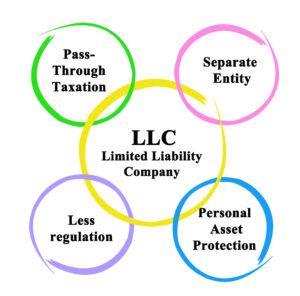
There are roughly 21.6 million LLCs in the United States. In comparison, there are approximately 1.7 million traditional C-Corporations, and approximately 23 million sole proprietorships. IRS statistics show a year over year increase in domestic LLCs since 2004. There are many reasons that one would choose an LLC over other entity structures, including, without limitation, certain tax benefits and liability protections. LLCs are entities formed under state law that give the owners liability protection while providing an option to avoid the double taxation inherent in C-Corporations and the ownership restrictions of S-Corporations. Where partnerships have “partners” and corporations have “shareholders”, LLCs have “members”. We have compiled an overview of some features that help explain the popularity of LLCs, as well as their limitations.
It might be a good idea to think about an LLC for your business.
LLCs are so popular, but why?
Typically, C-Corporations, or S-Corporations”, are often the first to come to mind. The “C” and the “S” refer to IRS Code Sections. C corps feature a double taxation – one tax at the company level and another tax on profits distributed to shareholders. This double tax is why many people consider S corps, which has only one level of tax. But there are restrictions on ownership of S corps, which is why LLCs easily slide into the picture.
LLCs are popular because they are not only extremely easy to form, but they are also easy to run. They make taxes much more streamlined, require less corporate formalities, provide for greater flexibility, and they have limited liability for owners too.
What are the benefits of choosing an LLC as a business entity?
A limited liability company, or LLC, is a hybrid business structure that combines the simplicity, flexibility, and tax advantages of a partnership with the liability protection of a corporation. An LLC gives you the benefits of a corporation without the many hassles. Some of the most important benefits are outlined below.
Limited personal liability
When you form a corporation or an LLC it becomes a separate legal entity apart from its owners. This means that the business itself can own assets, enter into contracts, and is liable for its own debts.
If the corporation or LLC cannot pay its debts, creditors can normally only go after the assets owned by the company and not the personal assets of the owners. However, the business owner can also be held responsible for corporate or LLC debts in certain situations.
Of course – the tax advantages 
Although an LLC is a separate legal entity, it is not a separate entity for tax purposes. There is no separate tax classification for an LLC. Instead, it adopts the tax status of whichever entity it would like—including a sole proprietorship, partnership, S-Corp, or C-Corp. This flexibility allows the company owners to decide which tax status will be the most advantageous for their situation.
The process is ‘simpler’
An LLC does not have to meet the more specific, and sometimes more onerous, requirements regarding filings, organizational documents, and corporate formalities that are typically applicable to corporations under state law. Holding regular board/shareholder meetings, creating annual reports, and paying annual fees are all fairly common for a corporation. But an LLC can often avoid these time-consuming requirements. Forming an LLC is often a much easier process as well.
There is more ownership and management flexibility
The LLC offers more management flexibility. The LLC is governed according to an initial document called the operating agreement. Unlike a corporation’s articles of incorporation, an operating agreement is easier to modify as the business evolves. An LLC is either “member-managed” or “manager-managed.” In member-managed LLCs, members make the day-to-day decisions for the company. In manager-managed LLCs, members select one or more managers to run the business, or specific parts thereof.
The operating agreement will also delineate decisions that require a member vote. Under Pennsylvania law, voting power is per capita (i.e., each member gets a vote), unless the operating agreement states that voting shall be based on capital contribution.
In terms of ownership flexibility, an S-Corporation has the benefit of pass-through taxation, but it cannot have more than 100 shareholders, and they cannot have foreign shareholders or shareholders that are corporations. LLCs do not have those same restrictions—and they can use pass-through taxation if they want to do that.
Corporations must have a certain type of ownership structure. Specifically, they must have a board of directors, along with shareholders who periodically meet to review the company’s business or to approve certain corporate actions. An LLC is not required have to have a board of directors (although it can have a board of managers). The LLC members can create a management structure that works for however they want to run the company.
What are the challenges and disadvantages of an LLC?
Even though there are quite a few benefits to an LLC, there are some drawbacks as well. For small businesses, there are not many. The LLC is the entity of choice in most situations. However, in Pennsylvania, it is often not the entity of choice to hold and develop real estate that may appreciate significantly in value. Also, if you intend to raise significant outside capital, many investors also prefer traditional corporations.
No separate tax designation
As noted above, the IRS does not have a separate tax designation for LLCs. This means that LLCs must choose whether they want to be taxed like a partnership or like a corporation. By default, LLCs are taxed like partnerships, meaning LLC profits are passed through to the owners and taxed with the owners’ income taxes. If LLCs complete proper IRS forms on time, they can choose to be taxed like corporations, meaning they are taxed twice: once on profits at the corporate level and again on any distributions at the individual ownership level.
 Should your company be an LLC?
Should your company be an LLC?
It depends, because every situation is different. Choosing the proper entity form can make or break a new business. There are several choices: C-Corporation (C-Corp), S-Corporation (S-Corp), Limited Liability Company (LLC), Limited Liability Partnership (LLP) or a Partnership. There are advantages and disadvantages to operating under each of these forms. In choosing the proper form, it is important to consider several tax and non-tax factors, including liability, taxation, management, and ownership structure.
If you are going to create a business entity, LLCs have a lot of advantages over other similar types of businesses. If you are unsure about whether creating an LLC is a good option for you, ask a lawyer at Fitzpatrick Lentz & Bubba. If you are ready to incorporate your business as an LLC, S-Corp, C-Corp, or Nonprofit, let our team help make the incorporation process as simple and efficient as possible.









